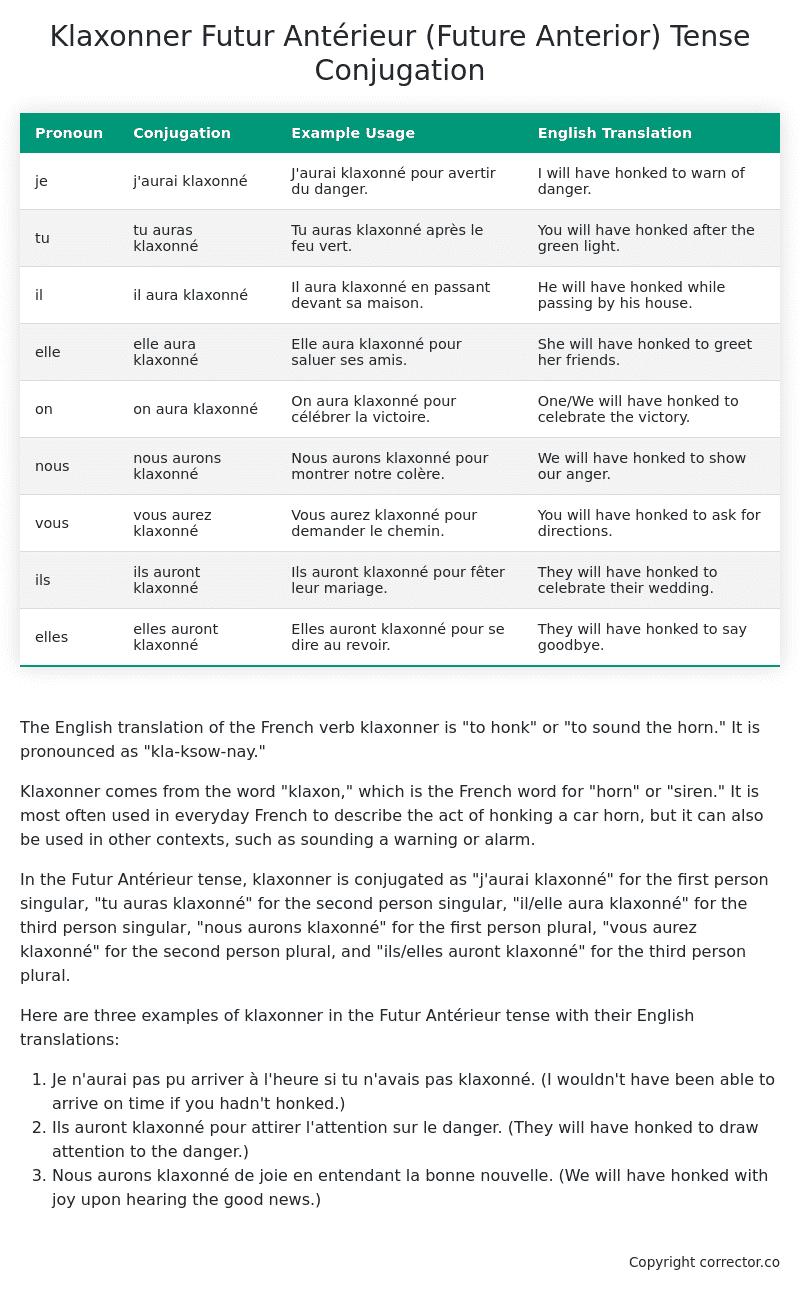Futur Antérieur (Future Anterior) Tense Conjugation of the French Verb klaxonner
Introduction to the verb klaxonner
The English translation of the French verb klaxonner is “to honk” or “to sound the horn.” It is pronounced as “kla-ksow-nay.”
Klaxonner comes from the word “klaxon,” which is the French word for “horn” or “siren.” It is most often used in everyday French to describe the act of honking a car horn, but it can also be used in other contexts, such as sounding a warning or alarm.
In the Futur Antérieur tense, klaxonner is conjugated as “j’aurai klaxonné” for the first person singular, “tu auras klaxonné” for the second person singular, “il/elle aura klaxonné” for the third person singular, “nous aurons klaxonné” for the first person plural, “vous aurez klaxonné” for the second person plural, and “ils/elles auront klaxonné” for the third person plural.
Here are three examples of klaxonner in the Futur Antérieur tense with their English translations:
- Je n’aurai pas pu arriver à l’heure si tu n’avais pas klaxonné. (I wouldn’t have been able to arrive on time if you hadn’t honked.)
- Ils auront klaxonné pour attirer l’attention sur le danger. (They will have honked to draw attention to the danger.)
- Nous aurons klaxonné de joie en entendant la bonne nouvelle. (We will have honked with joy upon hearing the good news.)
Table of the Futur Antérieur (Future Anterior) Tense Conjugation of klaxonner
| Pronoun | Conjugation | Example Usage | English Translation |
|---|---|---|---|
| je | j’aurai klaxonné | J’aurai klaxonné pour avertir du danger. | I will have honked to warn of danger. |
| tu | tu auras klaxonné | Tu auras klaxonné après le feu vert. | You will have honked after the green light. |
| il | il aura klaxonné | Il aura klaxonné en passant devant sa maison. | He will have honked while passing by his house. |
| elle | elle aura klaxonné | Elle aura klaxonné pour saluer ses amis. | She will have honked to greet her friends. |
| on | on aura klaxonné | On aura klaxonné pour célébrer la victoire. | One/We will have honked to celebrate the victory. |
| nous | nous aurons klaxonné | Nous aurons klaxonné pour montrer notre colère. | We will have honked to show our anger. |
| vous | vous aurez klaxonné | Vous aurez klaxonné pour demander le chemin. | You will have honked to ask for directions. |
| ils | ils auront klaxonné | Ils auront klaxonné pour fêter leur mariage. | They will have honked to celebrate their wedding. |
| elles | elles auront klaxonné | Elles auront klaxonné pour se dire au revoir. | They will have honked to say goodbye. |
Other Conjugations for Klaxonner.
Le Present (Present Tense) Conjugation of the French Verb klaxonner
Imparfait (Imperfect) Tense Conjugation of the French Verb klaxonner
Passé Simple (Simple Past) Tense Conjugation of the French Verb klaxonner
Passé Composé (Present Perfect) Tense Conjugation of the French Verb klaxonner
Futur Simple (Simple Future) Tense Conjugation of the French Verb klaxonner
Futur Proche (Near Future) Tense Conjugation of the French Verb klaxonner
Plus-que-parfait (Pluperfect) Tense Conjugation of the French Verb klaxonner
Passé Antérieur (Past Anterior) Tense Conjugation of the French Verb klaxonner
Futur Antérieur (Future Anterior) Tense Conjugation of the French Verb klaxonner (this article)
Subjonctif Présent (Subjunctive Present) Tense Conjugation of the French Verb klaxonner
Subjonctif Passé (Subjunctive Past) Tense Conjugation of the French Verb klaxonner
Subjonctif Imparfait (Subjunctive Imperfect) Tense Conjugation of the French Verb klaxonner
Subjonctif Plus-que-parfait (Subjunctive Pluperfect) Tense Conjugation of the French Verb klaxonner
Conditionnel Présent (Conditional Present) Tense Conjugation of the French Verb klaxonner
Conditionnel Passé (Conditional Past) Tense Conjugation of the French Verb klaxonner
L’impératif Présent (Imperative Present) Tense Conjugation of the French Verb klaxonner
L’infinitif Présent (Infinitive Present) Tense Conjugation of the French Verb klaxonner
Struggling with French verbs or the language in general? Why not use our free French Grammar Checker – no registration required!
Get a FREE Download Study Sheet of this Conjugation 🔥
Simply right click the image below, click “save image” and get your free reference for the klaxonner Futur Antérieur tense conjugation!

Klaxonner – About the French Futur Antérieur (Future Anterior) Tense
Construction
Common Everyday Usage Patterns
Interactions with Other Tenses
For example
Summary
I hope you enjoyed this article on the verb klaxonner. Still in a learning mood? Check out another TOTALLY random French verb conjugation!


